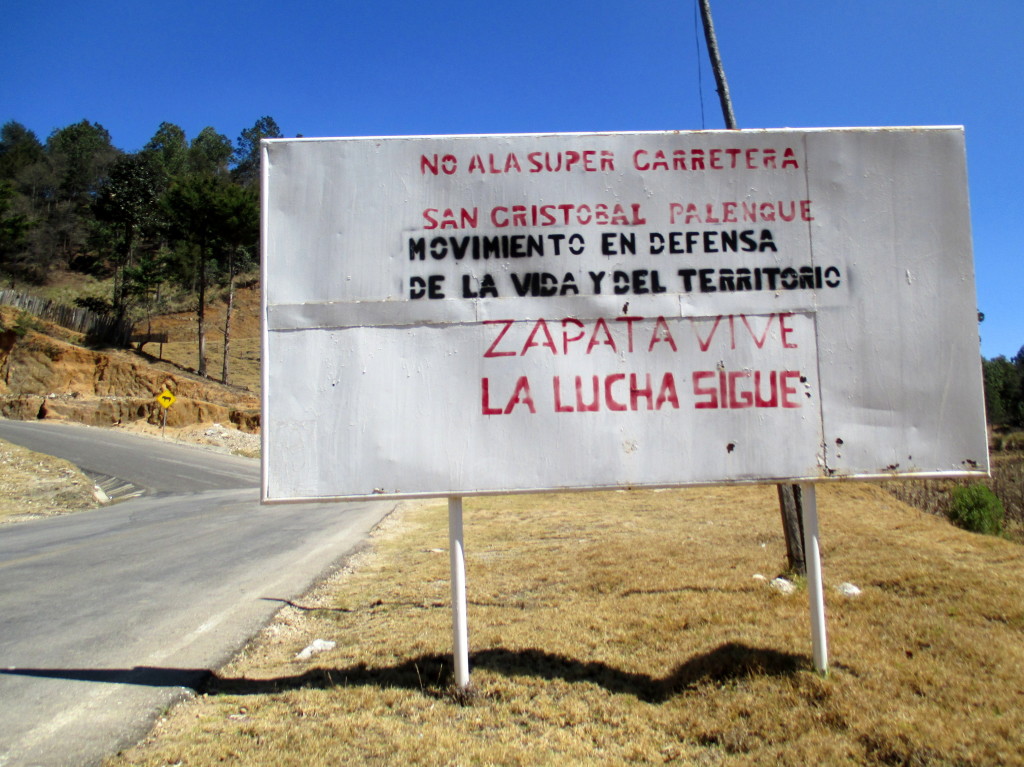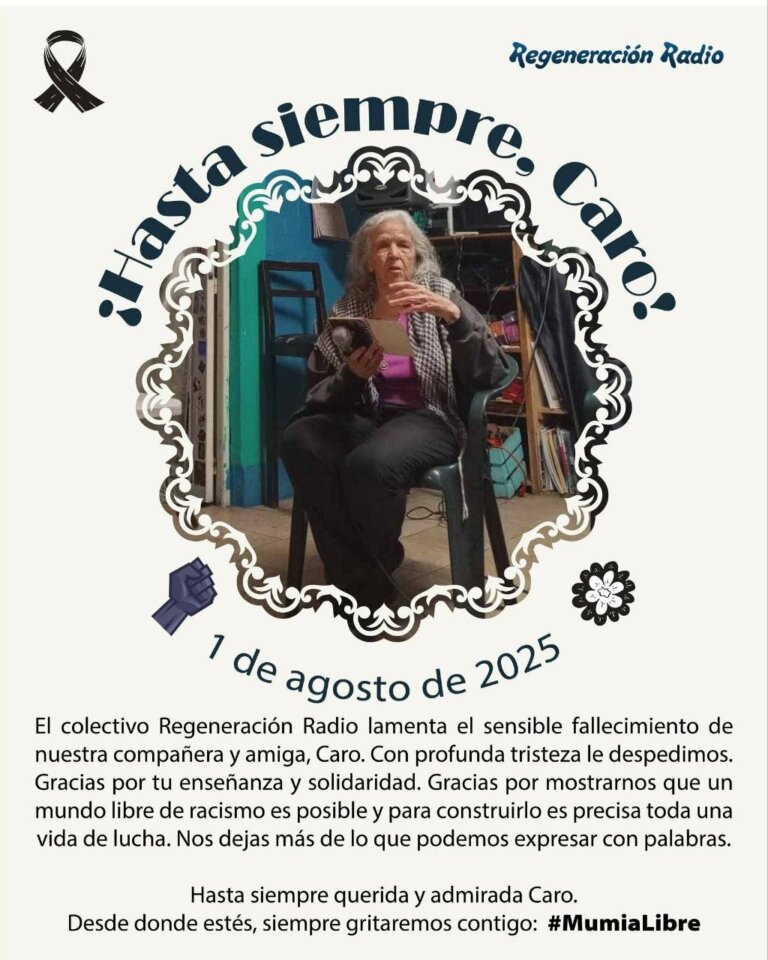By Scott Campbell
Originally published on It’s Going Down
Welcome to the first edition of “Insumisión,” a new column on It’s Going Down, bringing you news and analysis from social movements and struggles in the territory referred to as Mexico. Let’s get started.
As readers of It’s Going Down might already be aware, in Mexico City last Wednesday, Yorch, a member of Okupa Che, was kidnapped by police in the latest round of repression to face the autonomous, anti-authoritarian space on the campus of the National Autonomous University of Mexico, held since the 1999-2000 student strike. Police planted a backpack full of drugs on Yorch, who is now captive in a federal prison in Sonora. The morning after the arrest, compañerxs blockaded access to UNAM with burning dumpsters, and Molotov cocktails were unleashed on the UNAM Campus Security offices and patrol cars. The clamor to evict Okupa Che has steadily grown since Yorch’s arrest. Okupa Che released a statement, calling for solidarity and for people to be on alert to respond to any eviction attempt. Anarchist political prisoner Fernando Bárcenas (who received acts of solidarity from Tijuana to Bloomington earlier this year) sent an open letter in solidarity with Yorch, which reads in part:
It is not my intention to send a message of sympathy or pity, on the contrary, I intend to send a message of war, insurrectionary love and solidarity…In the streets or in the jail, we have to do nothing more than keep moving forward until all are free…Although along the way we stumble upon death…Unconditional and revolutionary solidarity with compa Yorch, prisoner of war…
From the mountains of the Mexican Southeast, the Zapatistas released a flurry of statements over the past week. The first two contrasted the conditions in communities affiliated with political parties with the situation in Zapatista communities. These were followed by a brief, and literal, “fuck you” to the Mexican judiciary following news that the statute of limitations had expired on charges of terrorism, sedition, riot, rebellion, conspiracy, etc., that Subcomandante Marcos was facing for the past twenty years. An open letter from Subcomandante Galeano to Mexican journalist and writer Juan Villoro Ruiz reflected on the role of art and sciences in effecting change, giving particular attention to women’s liberation: “So if they ever asked me, the ghostly shadow of an impertinent nose, to define the aim of Zapatismo, I would say: ‘To create a world where women are born and grow without fear.’” All these were rounded out by a short statement outlining public Zapatista events that will be held in 2016, focusing on the arts and sciences.
February 16 marked twenty years since the signing of the San Andrés Accords between the Mexican government and the EZLN. Accords that were gutted before another bill substituted in their place was passed by the Mexican Congress, and where even a cursory look at the current situation in Chiapas shows the government’s complete disdain for indigenous self-determination and autonomy. The indigenous Chol village of Tila, in the Chiapan jungle, declared its autonomy on December 16 of last year following clashes with local authorities, announcing that the municipal government was no longer permitted in their territory. Several human rights groups issued a statement warning of possible state repression as a result of their declaration. A few days later, on December 20, the indigenous community of San Isidro Los Laureles – adherents of the EZLN’s Sixth Declaration and members of the Zapatista-initiated National Indigenous Congress – reclaimed 200 hectares of ancestral land. Last month, the supposed landowners sent six heavily armed men to drive through the land, raising fears of a possible attack. The indigenous Tzotzil village of Candelaria is organizing against a plan to construct the San Cristóbal-Palenque tourist highway through their communally held lands, as well as working with each community along the planned route to oppose the entire project. The village released a statement condemning the “neoliberal and patriarchal capitalist system” and in particular the Mesoamerica Project (formerly known as Plan Puebla-Panama) that seeks to create a neoliberal wasteland from the Mexican state of Puebla all the way to Panama.
On February 22, Las Abejas Civil Society Organization, a religious pacifist group that supports the Zapatistas’ demands, issued a message reflecting on 18-plus years since the massacre of 45 of their members by paramilitaries in Acteal: “We don’t trust in the laws dictated by the senators and representatives as they are not for the benefit of Mexican society. The laws they pass are to benefit the rich criminals and big businesses who exploit mother earth. Today we cry out our pain and anguish because the majority of the peoples in resistance are persecuted by armies, are spied on by paramilitaries. The government is seeking a strategy to do away with human rights defenders and indigenous peoples.” The autonomous municipality of Vicente Guerrero, also adherents of the Sixth Declaration, was attacked in December by political party-affiliated groups who destroyed several houses. At the same time, the Federal Electricity Commission (CFE) cut off families’ access to electricity and water. Nine families of 47 people have been displaced and are demanding an end to repression and the right to return to their lands in the Shulvó area. And in the indigenous Zoque village of Chicoasén, the community is escalating its efforts to stop a third hydroelectric dam from being built on their communal lands. As a result of their opposition, most members of the community have arrest warrants out against them, despite nearly all of them being more than 70 years old. Last year, the CFE and government arrested the community’s lawyer, holding him in jail for three months on the false charge of starting a riot.
In Campeche, the CFE is going after members of the Civil Resistance Against High Electricity Rates in Candelaria. Two members currently have arrest warrants out against them. In 2009, five of their members were jailed on trumped up charges. Electricity rates in Mexico are often exorbitant and fluctuate with seeming arbitrariness. All this while in Oaxaca, the government, in collusion with multinationals, continues to try to force indigenous peoples off their lands to build wind farms in order to provide cheap electricity to companies like Wal-Mart. Also in Oaxaca, the government issued three more arrest warrants, in addition to the 27 that already exist, against members of the state’s teachers union, Section 22 of the CNTE. Section 22, which has its own internal issues with corruption and nepotism, was at the forefront of the Oaxaca Rebellion of 2006 and has since resisted attempts to privatize and standardize the education system. They have also been militant supporters of the Ayotzinapa struggle, including leading a boycott of the 2015 elections where they stormed and set fire to a National Electoral Institute office and burned ballots. Four members of the Section 22’s Political Commission are currently in federal prison.
February 26 marked 17 months since the disappearance of 43 students from Ayotzinapa and the police killing of six other people in Guerrero. For the first time in those seventeen months the parents of the students were able to meet with one of the judges presiding over the case, but not before their protest caravan was attacked by Federal Police in Aguascalientes. Meanwhile, the Interdisciplinary Group of Independent Experts investigating the disappearances denounced the various obstacles the Mexican government has put in place to impede their investigation.
In other news, SubVersiones has released a 50 minute documentary on the resistance of the indigenous Nahua community of Zacualpan in Colima to a mining project. In Mexico State, Venancio Queupumil Cabrera, a Chilean doctor and activist persecuted under Pinochet was assassinated in his clinic. In Puebla, organizations are expressing alarm at the increase in violence, in particular femicides, after fourteen women were killed in the first two months of 2016. Political prisoner Nestora Salgado, head of the Community Police in Olinalá, Guerrero, is awaiting a ruling from a judge that could see her released in the coming days. And of course the Pope was in Mexico last month. Also on SubVersiones, Alejandro Amado noted, “The visit of Jorge Mario Bergoglio, Pope Francis, has left much to be desired regarding the coherence of his discourse with his practice. He claims to be on the side of the poor, yet attends lavish ceremonies with the first line of corruption in Mexico, then come the public baths…[In Morelia], Pope Francis described it as ‘childish to blame the State’ for the disappearance of the students [from Ayotzinapa]. ‘One, two, three…’ an anonymous shout began counting, which was seconded by the larger part of those present; the count stopped at 43 and with a request for prayers for the students disappeared at the hands of State forces since September 2014.”



